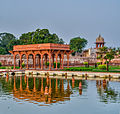Portal:Gardening
The Gardening Portal

Gardening is the process of growing plants for their vegetables, fruits, flowers, herbs, and appearances within a designated space. Gardens fulfill a wide assortment of purposes, notably the production of aesthetically pleasing areas, medicines, cosmetics, dyes, foods, poisons, wildlife habitats, and saleable goods (see market gardening). People often partake in gardening for its therapeutic, health, educational, cultural, philosophical, environmental, and religious benefits. Gardening varies in scale from the 800 hectare Versailles gardens down to container gardens grown inside. Gardens take many forms, some only contain one type of plant while others involve a complex assortment of plants with no particular order. (Full article...)
Horticulture is the science and art of growing fruits, vegetables, flowers, or ornamental plants. Horticulture is commonly associated with the more professional and technical aspects of plant cultivation on a smaller and more controlled scale than agronomy. There are various divisions of horticulture because plants are grown for a variety of purposes. These divisions include, but are not limited to: propagation, arboriculture, landscaping, floriculture and turf maintenance. For each of these, there are various professions, aspects, tools used and associated challenges; Each requiring highly specialized skills and knowledge of the horticulturist. (Full article...)
General images -
Selected article -

The Japanese dry garden (枯山水, karesansui) or Japanese rock garden, often called a Zen garden, is a distinctive style of Japanese garden. It creates a miniature stylized landscape through carefully composed arrangements of rocks, water features, moss, pruned trees and bushes, and uses gravel or sand that is raked to represent ripples in water. Zen gardens are commonly found at temples or monasteries. A Zen garden is usually relatively small, surrounded by a wall or buildings, and is usually meant to be seen while seated from a single viewpoint outside the garden, such as the porch of the hojo, the residence of the chief monk of the temple or monastery. Many, with gravel rather than grass, are only stepped into for maintenance. Classical Zen gardens were created at temples of Zen Buddhism in Kyoto during the Muromachi period. They were intended to imitate the essence of nature, not its actual appearance, and to serve as an aid for meditation. (Full article...)
Selected image

Related portals
Did you know -
- ... that Parimal Garden in Ahmedabad has scrap-metal monkeys?
- ... that the Shakespeare garden in Wessington Springs, South Dakota, was the first of its kind in the state?
- ... that The Lord of the Ice Garden, a Polish novel series mixing elements of fantasy and science fiction, has been compared to The Witcher?
- ... that none of the actors in Poppy Garden, a film depicting a father and son's struggle for survival during the Colombian conflict, had previously acted in a film?
- ... that actress Katharine Hepburn threatened to remove her name from a garden in Dag Hammarskjöld Plaza when New York City officials said they would not widen the plaza?
- ... that Tucker Hall and Ewell Hall sit on either side of the Sunken Garden on the College of William & Mary's campus?
- ... that a "bat ensnared by a plant" was discovered in the garden of the Palestine Museum of Natural History?
- ... that in 2023, a sculpture garden in Praunheim displayed abstract works by Hans Steinbrenner from different periods of his life, and corresponding works by his friends and students?
Things you can do
- This list is transcluded from the tasks list page. To edit the list, click here
 |
Here are some tasks awaiting attention:
|
WikiProjects
Topics
Categories
Associated Wikimedia
The following Wikimedia Foundation sister projects provide more on this subject:
-
Commons
Free media repository -
Wikibooks
Free textbooks and manuals -
Wikidata
Free knowledge base -
Wikinews
Free-content news -
Wikiquote
Collection of quotations -
Wikisource
Free-content library -
Wikiversity
Free learning tools -
Wiktionary
Dictionary and thesaurus
































































































